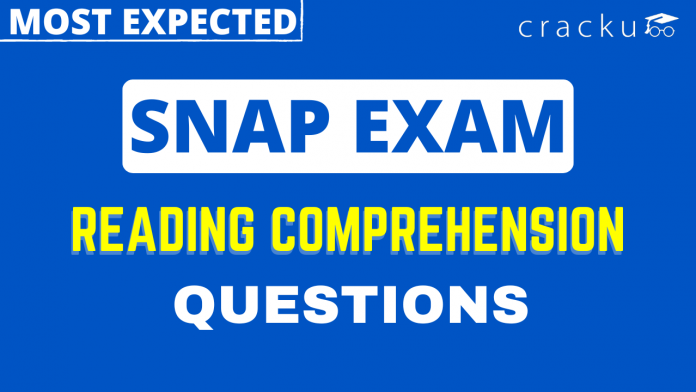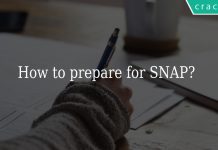Reading Comprehension Questions for SNAP
Here you can download a free Reading Comprehension questions PDF with answers for SNAP 2022 by Cracku. These questions will help you to practice and solve the Reading Comprehension questions in the SNAP exam. Utilize this PDF practice set, which is one of the best sources for practising and includes detailed answers.
Download Reading Comprehension Questions for SNAP
Enroll to SNAP 2022 Crash Course
Instructions
Read the passage carefully and answer the questions that follow:
In the Fifth grade, Benjamin Carson thought he was one of the dumbest kids in his class. His classmates thought he was one of the dumbest, his teacher thought he was one of the dumbest, and he thought he was one of the dumbest. Therefore, when he brought home a report that reflected poor progress, Benjamin was very philosophical about it. He told his mother, “Yah, you know it doesn’t matter very much”.
His mother had a different opinion. Having only a third grade education, Mrs. Carson knew that her children’s only chance to escape poverty was through a good education. Her two boys were not reaching their potential at school, and she knew that if they were going to get a good education, it would have to start at home. She began with three rules. Rule number one, the boys would only be allowed to watch two pre-selected TV shows per week. Rule number two, the two boys would have to finish all their homework before they could watch TV or even play outside. Rule number three, the boys would have to read two books from the library each week and write a book report on each of them.
Benjamin was dismayed at these new rules and tried very hard to talk his mother out of them. She stood firm, and not thinking to disobey his mother, he followed her rules. Before long he saw the fruits of his labor, when he was the only one who knew an answer to a question the teacher asked the class. Then there was a second question only he knew the answer to. His teacher and rest of his classmates were surprised that he knew the correct answer to such hard questions. He was even a little surprised himself, but he knew his knowledge came from the books he was reading. He began to surmise that if he could learn just a few facts from books at the library, he could learn anything.
Benjamin continued on his road of growth and became an academic leader in his school. He had learned to love reading and realized that he could channel that love into learning. He did not let the labels and jeers of others, forever box him into an unproductive and unfulfilling future. Mrs. Carson did not settle for less then her boys were capable of being, she demanded that they take their education seriously and gave them a structured way they could do it. Today Benjamin Carson, the boy who thought he was the dumbest boy in his 5th grade class, is a world famous surgeon at the prestigious Johns Hopkins Hospital in Maryland.
Question 1: Which of the following is a synonym of the word “unproductive”?
a) helpful
b) useless
c) beneficial
d) fruitful
e) worthwhile
1) Answer (B)
Solution:
Unproductive means ‘not productive or not useful’. Among the options, the word that is closest in meaning to this is ‘useless’. All the other words are antonyms of this word. Option b) is the correct answer.
Question 2: Which of the following is a synonym of the word “surmise”?
a) preach
b) teach
c) surprise
d) infer
e) generalize
2) Answer (D)
Solution:
The word surmise means to deduce or infer. From the options, the word ‘infer’ is the most suitable. Option d) is the correct answer.
Question 3: Which of the following is a synonym of the word “dismay”?
a) composed
b) tranquility
c) anxiety
d) confidence
e) security
3) Answer (C)
Solution:
‘Dismay’ means ‘distressed’. Among the options, the word that is closest in meaning to this word is ‘anxiety’. The other words are antonyms of this word. Option c) is the correct answer.
Question 4: Which of the following is a synonym of the word “philosophical”?
a) abstract
b) concrete
c) analytical
d) rational
e) irrational
4) Answer (A)
Solution:
The word ‘philosophical’ means to be abstract and not take a concrete stand. From the options, the word ‘abstract’ is the most suitable. The other words are either antonyms of the word or they are unrelated to the word. Option a) is the correct answer.
Question 5: Which of the following statements can be inferred from the passage?
a) Benjamin was the first person in his family to graduate high school
b) Benjamin realized that he had a good chance of becoming a doctor after he answered the two questions
c) Benjamin’s mother stressed on good education because she did not have the opportunity to study much
d) Benjamin and his brother were the only two people in his family to go to college
e) None of the above
5) Answer (E)
Solution:
We do not have information about Benjamin’s brother. So, we cannot say if he went to college or not. Options a) and d) cannot be inferred. Benjamin realized that he could get do well in studies when he answered the questions but we cannot say he realized then that he could become a doctor. So, option b) cannot be inferred. Option c) also cannot be inferred. We cannot say if Mrs. Carson could not get good education because of a lack of opportunity. Option e) is the correct answer.
Question 6: Why did Benjamin’s mother insist so much on proper education for her sons?
a) Because she herself never got the opportunity to study beyond the third grade
b) Because she could not realize her dreams and she wanted her sons to realize her dream
c) Because she knew that the best chance for them to get out of poverty was by having good education
d) Because Benjamin and his brother had no clue about what they were missing in life
e) Because Benjamin and his brother were too philosophical and did not care much about education
6) Answer (C)
Solution:
Consider the following sentence from the paragraph: “Having only a third grade education, Mrs. Carson knew that her children’s only chance to escape poverty was through a good education”. So, Benjamin’s mother insisted on a proper education for her sons because she knew that the best chance for them to escape poverty was by getting good education. Option c) is the correct answer.
Question 7: What is the tone of the passage?
a) humorous
b) descriptive
c) critical
d) analytical
e) narrative
7) Answer (E)
Solution:
In the passage, the author narrates the story of Benjamin. So, the tone of the passage is ‘narrative’. Option e) is the correct answer.
Question 8: What was the incident that made Benjamin’s teachers realize his true potential?
a) Benjamin’s teachers never realized his true potential
b) The setting of the rules by Benjamin’s mother
c) Benjamin’s frequent visits to the library
d) The incident in the classroom when Benjamin was able to answer difficult questions
e) Cannot be inferred from the passage
8) Answer (E)
Solution:
After the incident in the classroom, when Benjamin was able to give answers to difficult questions, he started to realize his potential. However, there is no information in the passage about when Benjamin’s teachers realized his potential or whether they realized his true potential at all. So, option e) is the correct answer.
Question 9: How did Mrs. Carson help her sons realize their true potential?
a) By setting three rules
b) By giving her sons a structured approach to education
c) By helping her sons realize the importance of education
d) By helping her sons with their homework
e) None of the above
9) Answer (B)
Solution:
Refer to the following sentence from the paragraph: “Mrs. Carson did not settle for less then her boys were capable of being, she demanded that they take their education seriously and gave them a structured way they could do it”. So, Mrs. Carson helped her sons realize their true potential by giving them a structured approach to education. Option b) is the correct answer.
Question 10: What was Benjamin’s first reaction to his mother’s rules?
a) He plotted with his brother to try to talk their mother out of the rules
b) He did not have any reaction because he had a philosophical bent of mind
c) He felt distressed and tried to get his mother to change the rules
d) He felt happy that he was finally getting some help
e) He was not happy but welcomed them anyway
10) Answer (C)
Solution:
Refer to the following sentence from the paragraph: “Benjamin was dismayed at these new rules and tried very hard to talk his mother out of them”. So, Benjamin was distressed and tried to get his mother to change the rules. Option c) is the correct answer.
Take SNAP mock tests here
Enrol to 10 SNAP Latest Mocks For Just Rs. 499
Instructions
Read the following passage and answer the questions below.
Consider your average morning routine. Most of us begin taking in the day’s news as soon as the clock radio wakes us up. Then there is the morning news brief from the television while eating breakfast followed by a local radio station during our commute. Throughout the day people continue to glean important events from news sites on the internet. Now consider what your day would look like if all of these resources fell silent.
There are continual reminders that our nation’s power grid is much more fragile than we would like to admit. Such threats do exist not only as foreign or domestic, but extra-worldly as well. Modern power grids are managed by computer networks and the potential exists for hacking into those networks to interrupt the power supply. Another less sinister, but just as hazardous threat comes from outside our own planet. The very sun that we rely upon every day occasionally ejects powerful solar flares known as coronal mass ejections or CMEs. These powerful electromagnetic fields can wreak havoc on sensitive electronic components and have already caused major power outages in recent history and scientists continue to predict that the sun is primed for another such event.
The technology for electromagnetic bombs, developed over the past 30 years, is now available to download from on the internet! Googling it demonstrates the ease with which a would-be enemy could devastate society, creating an enormous blackout with mass panic and havoc. Such powerful electronic pulses pose a significant threat to breakdown all traditional communication including satellites that control every aspect of transportation, commerce and ultimately life.
Other potential problems with national and regional grids are not posed by external threats, but by the continued and rapid growth of our own cities. While such power demands are on the rise, the capacity to provide power to them is not keeping pace. The battle between environmental groups and political decision makers only seems to be maintaining the status quo and not improving the reliability of our energy needs.
If any one of these events transpires and our power grid fails, where would we get our news and information? While we could certainly continue to live day-to-day without a sizable amount of the information we take in, there is some information that we simply would find hard to live without. In the case of a regional or national disaster, reliable and accurate information can be the biggest factor in safety and survival.
How fortunate we are that there are trained amateur radio operators scattered across the country who are poised to fill this important gap if ever needed. With an emergency generator and communication tools, these operators have the equipment and coding skills necessary to process and relay important information at a moment’s notice. Many of these operators utilize an assortment of methods, but among them Morse code gets through when other methods fail. As we have seen in so many movies, confirmed by actual real life experiences, the effectual transmission of dahs and dits between trained operators is a very useful method of communicating both securely and accurately. Why not join this family of ham radio operators and enjoy the fun and lifelong friendships that result?
If you prepare by learning Morse code, you will be on the front lines of the vital communication network and could be responsible for bringing peace, comfort and safety information to friends and family. Some things may be better left to others, but wouldn’t you feel safer knowing that you have done everything you could do in an emergency? Morse code continues to be a valuable survival skill for you, your family and for the nation.
– By Gerald Wheeler Ed.D.
Question 11: Which of the following is a synonym to the word “EFFECTUAL” in the context of the passage?
a) productive
b) useless
c) impotent
d) authoritative
e) conclusive
11) Answer (A)
Solution:
The author is talking positively about the Morse code.
So, ‘useless’ and ‘impotent’ can be eliminated.
‘Authoritative’ and ‘conclusive’ are not the words that can be used to describe ‘transmission’.
Hence, ‘productive’ is the correct answer.
Question 12: Which of the following is synonymous to the word “ASSORTMENT” in the context of the passage?
a) similar
b) akin
c) comparable
d) variety
e) group
12) Answer (D)
Solution:
“Many of these operators utilize an assortment of methods, but among them Morse code gets through when other methods fail.”
This sentence suggests that among various method, Morse code gets through whereas others fail.
=> Assortment must mean ‘various’.
=> Options A, B and C can be eliminated.
“Group of methods” appears to be a restricted list wheras “variety of methods” appears to be many methods.
Hence, ‘variety’ is a better fit for the blank.
=> Option D is the answer.
Question 13: Which of the following is synonymous to the word “SINISTER” in the context of the passage?
a) nasty
b) lucky
c) corrupt
d) fortunate
e) bland
13) Answer (A)
Solution:
“Another less sinister, but just as hazardous threat comes from outside our own planet.”
The word sinister must give the same connotation as hazardous.
=> Options B, D and E can be eliminated.
“Corrupt threat” is not appropriate.
=> ‘nasty’ is the answer.
Question 14: What is the advantage of learning Morse code, according to the passage?
a) You will get very good jobs in the field of disaster management
b) You can bring peace and safety to the society
c) You will be able to make a difference to the society
d) You can find the solutions of the problems described in the passage
e) None of these
14) Answer (B)
Solution:
“… could be responsible for bringing peace, comfort and safety information to friends and family.”
From this statement, we can say that option B is the answer.
Question 15: Why did the author ask to consider a world that has none of the radio resources?
a) To make us aware of what a normal individual would do daily.
b) To change from the daily routine for a few days.
c) To make us understand the intensity of the problem he is trying to point out.
d) To help us be ready to face such a situation in the near future.
e) None of these
15) Answer (C)
Solution:
The author describes the general situation about the radio in the current world. Then he says to consider a situation where the radio-stations are not present.
Then he describes about the problems that could create such a situation.
So, the author is trying to make us understand the important of the problem.
Hence, option C is the answer.
Question 16: Why are the CMEs a probable hazard to the nation’s power-grid?
a) They cause major power outages
b) They have more current passing in them than in the power-grid
c) They are less sinister than the threat of hacking into the power-grid network
d) They cause a lot of damage to transportation, commerce and ultimately life
e) They damage delicate electronic components
16) Answer (E)
Solution:
“These powerful electromagnetic fields can wreak havoc on sensitive electronic components and have already caused major power outages in recent history.”
They caused major power outages in the past. This does not imply that they do that always => Option A can be eliminated.
Option E is clearly the answer as we can deduce from the first part of the above sentence.
Question 17: How many potential problems for the nation’s power-grid has the author described in the passage?
a) 1
b) 2
c) 3
d) 4
e) 5
17) Answer (D)
Solution:
The potential problems that the author described are “Possibility of hacking into the power-grid software”, “Coronal Mass ejections” ,”Electromagnetic bombs” and “Rapid growth of the cities”.
Hence, the author described 4 problems in the passage.
Question 18: What is the main point of the passage?
a) To describe how fragile the nation’s power-grid is.
b) To persuade the citizens to fight against the government to address the issues faced by the power-grid.
c) To help us understand how important the daily news is.
d) To persuade the citizens to learn the Morse code to be ready to face probable disasters.
e) To make us aware of the oncoming disaster.
18) Answer (D)
Solution:
The author describes the various issues that can occur with the power and then persuades you to learn Morse code in order to keep yourself, your family and your nation safe.
This statement is best described in option D.
Hence, option D is the answer.
Question 19: What is the author’s tone in the passage?
a) Analytical
b) Descriptive
c) Persuasive
d) Cynical
e) Sarcastic
19) Answer (C)
Solution:
The author describes the various issues that can occur with the power and then persuades you to learn Morse code in order to keep yourself, your family and your nation safe.
Hence, the author’s tone is persuasive.





